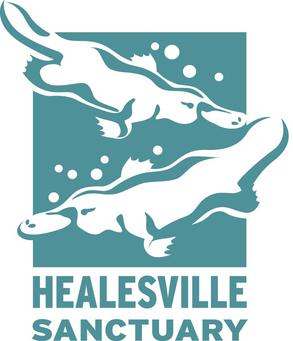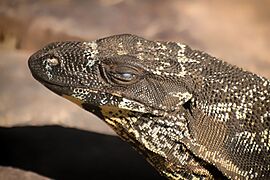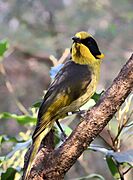Healesville Sanctuary facts for kids
 |
|
| Date opened | 1934 |
|---|---|
| Location | Healesville, Victoria, Australia |
| Land area | 28 acres (11 ha) |
| Coordinates | 37°40′56″S 145°31′54″E / 37.6822°S 145.5316°E |
| No. of species | 140+ |
Healesville Sanctuary, also known as the Sir Colin MacKenzie Sanctuary, is a special zoo in Victoria, Australia. It focuses on caring for and showing native Australian animals. The sanctuary is located in Healesville, a beautiful rural area.
This sanctuary is famous for its success in breeding native animals. It is one of only two places in the world that has successfully bred a platypus in captivity! The other place is Sydney's Taronga Zoo. Healesville Sanctuary also helps protect the endangered helmeted honeyeater by supporting its breeding program.
The zoo is set up like a natural bushland park. Paths wind through different areas where you can see amazing animals like wallabies, wombats, dingoes, kangaroos, and over 200 types of native birds. Visitors can enjoy guided tours, exciting bird shows, and learn a lot at the information areas.
History of Healesville Sanctuary
Early Beginnings
Dr Colin MacKenzie started an animal research center in 1920. It was built on 78 acres of land that used to be part of an Aboriginal reserve called Coranderrk. In 1934, this research center officially became the Sir Colin MacKenzie Sanctuary.
Platypus Breeding Success
A very important event happened in 1943. The first platypus ever born in captivity was born right here at the Sanctuary! This amazing achievement happened when David Fleay was managing the park.
Management and Challenges
On June 27, 1978, the park's management was taken over by the Victorian Zoological Parks and Gardens Board. In 2009, the sanctuary faced a big challenge during the Black Saturday bushfires. To keep the animals safe, many threatened species were moved to Melbourne Zoo.
New Platypus Conservation Centre
In 2025, Healesville Sanctuary opened the Australian Platypus Conservation Centre. This new facility is dedicated to helping injured or sick platypuses get better and then be released back into the wild. The center has special ponds with controlled temperatures, places for platypuses to burrow, and technology to watch them. This helps with both their recovery and important research. There are also plans for a visitor area to teach people about platypus conservation.
Animals and Exhibits
Healesville Sanctuary is home to a wide variety of Australian animals. You can explore different areas, each designed to show animals in their natural-like habitats.
General Exhibits
This area features a mix of fascinating Australian creatures.
|
Koalas Area
Come and see Australia's most famous marsupial!
Birds of the Bush
Discover many beautiful native birds in this exhibit.
- Eastern whipbird
- Fan-tailed cuckoo
- Orange-bellied parrot
- Princess parrot
- Rose-crowned fruit-dove
- Swift parrot
Kangaroos
Meet some of Australia's largest marsupials.
Gang-gang Aviary
This aviary is home to the unique Gang-gang cockatoo.
World of the Platypus
Learn all about the amazing platypus and other freshwater creatures.
Woodland Aviary
A peaceful aviary filled with various woodland birds.
Rock-wallabies Area
See different types of wallabies that live among rocks.
- Brush-tailed rock-wallaby
- Australian pelican
- Australian white ibis
- Black swan
- Dusky moorhen
- Magpie goose
- Pacific black duck
- Purple swamphen
Wetlands Aviary
This aviary showcases birds that live near water.
Wallabies
Explore the different kinds of wallabies at the sanctuary.
Wombat Closeup
Get a closer look at the fascinating wombat.
Animals of the Night
Discover the creatures that are active after the sun goes down.
|
|
Land of Parrots Aviary
A vibrant aviary filled with many colorful parrot species.
- Budgerigar
- Eclectus parrot
- Major Mitchell's cockatoo
- Red-tailed black cockatoo
- Australian brush-turkey
- Black-faced cuckoo-shrike
- Brush bronzewing
- Pacific emerald dove
- White-headed pigeon
- Wonga pigeon
- Zebra finch
Reptile Encounter
Meet a variety of reptiles, from snakes to lizards.
|
|
Lyrebird Forest
Explore the forest where the amazing lyrebird lives.
Larger Wetlands Aviary
A spacious aviary for various water birds.
Flying Foxes Area
Observe these interesting fruit bats.
See also
 | Jackie Robinson |
 | Jack Johnson |
 | Althea Gibson |
 | Arthur Ashe |
 | Muhammad Ali |





